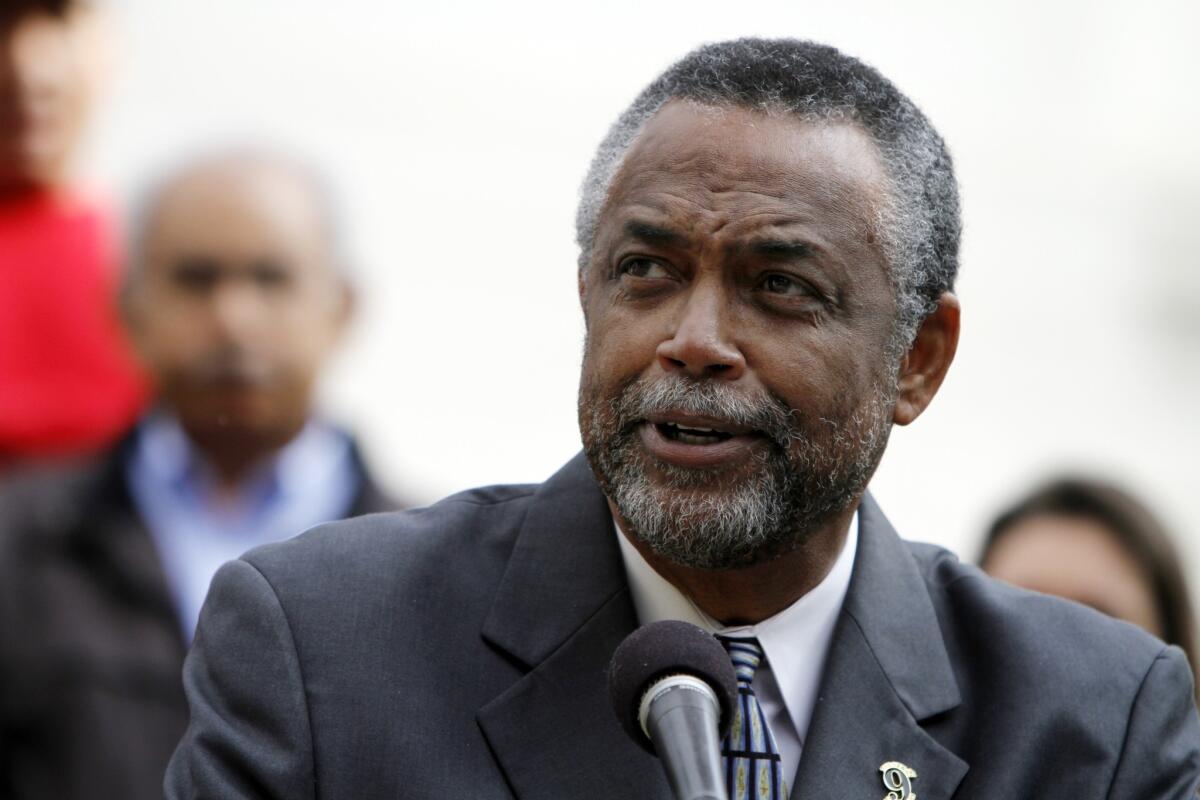L.A. panel takes key step toward wage boost for hotel workers

Los Angeles lawmakers took a crucial step Tuesday toward ramping up the minimum wage for thousands of hotel workers, asking staff to draft an ordinance that would increase their pay to at least $15.37 an hour.
City leaders have been considering the increase for workers at big, non-unionized hotels, a move championed by labor groups and backed by some civic and business leaders as a way to jumpstart the economy and pull workers out of poverty.
“Workers are working and living in poverty but the hotel industry has had record profits for three straight years,” said James Elmendorf, deputy director of the Los Angeles Alliance for a New Economy, a group focused on labor and environmental issues that advocated for the increase. “It’s a tremendously successful industry, yet hotel workers are the lowest paid workers in our city.”
The bump would guarantee targeted workers nearly twice the hourly California minimum wage -- now set at $8.
Key business groups, including the Los Angeles Area Chamber of Commerce, argue the proposal will cost jobs and discourage new hotels from opening. Some hotel managers argued Tuesday that they would be forced to slash as much as a fifth of their staffs.
Under a proposal given tentative support Tuesday by a council committee, the new pay rules would go into effect in July 2015 for hotels with at least 300 rooms. Smaller hotels with more than 125 rooms would have to pay the higher minimum wage starting a year later.
Councilman Curren Price asked staffers to ensure that the proposed rules also include a “hardship waiver” for hotels that would face severe financial challenges paying increased wages.
The decision to press forward with the plan came on the heels of a new study that did little to quash a debate over whether the wage hikes will help or harm the local economy.
To sort through the arguments, Los Angeles leaders commissioned an outside study to examine how increasing hotel workers’ wages would affect the city economy. But the newly released report, prepared by outside consultants at a cost of roughly $24,000, provided little clarity.
Boosting the minimum wage “represents an inherent trade-off,” the report said. On the one hand, the higher pay would help existing or newly hired hotel workers and the businesses where they spend their money. But other workers would likely lose their jobs and risk not getting hired elsewhere as hotel profits are squeezed, the report from Blue Sky Consulting Group concluded.
The analysis doesn’t say whether the economic costs would outweigh the benefits. Drawbacks would “at least partially offset” gains in economic activity, but the consultants wrote that they couldn’t estimate the exact size of those economic effects.
“It confirms all the concerns that our industry has,” said Bob Amano, executive director of the Hotel Assn. of Los Angeles. By jeopardizing jobs, “you’re hurting the people you’re trying to help.”
Some supporters of the wage increase argued that the report backed up their arguments, pointing to projected increased wages and spending by hotel employees.
Despite the clashing views, the City Council committee directed the city attorney to draft an ordinance increasing minimum pay at large hotels. The draft ordinance still would have to be approved by the full council.
Mayor Eric Garcetti has said he would sign a law increasing hotel workers’ minimum wage if the council approves it. But he also voiced concern that the wage boost would be limited to too few workers.
“I feel like there’s a lot of workers left behind,” Garcetti said before Tuesday’s meeting. “A lot of people in the city are still going to be earning hardly a livable wage.”
Several council members suggested increasing wages for hotel workers could be the beginning of a push for higher wages across Los Angeles or the state.
“This is the beginning of a conversation,” said Councilman Gil Cedillo. “Ultimately it must include all industries. Ultimately it must go beyond the city limits -- because we will be disadvantaged.”
The consultants didn’t gather new data for the report. Instead, they reviewed existing minimum wage studies, including local reports cited by labor groups.
They questioned the findings of an earlier study by the left-leaning Economic Roundtable, saying it probably overstated the boost in economic activity from a higher minimum wage for Los Angeles hotel workers. Other studies are not easily applicable to the proposed Los Angeles pay hike, they wrote.
“In spite of the fact that there are dozens or hundreds of studies that have been done of the impact of the minimum wage generally, there still isn’t a consensus among economists about what the effects are,” said Blue Sky partner Matthew Newman, one of the authors of the study.
At the Tuesday meeting, Councilman Paul Krekorian asked for staffers to seek a more comprehensive analysis before the rules go into effect, saying that the Blue Sky analysis had left him unsure whether Los Angeles would gain or lose from the proposal.
Though some workers will clearly benefit, “I’m going to put people out of work by voting for this ... and I don’t know whether it’s a net plus or not,” Krekorian said.
Blue Sky had suggested phasing in the wage boost to make it easier for hotels to adjust. The council committee instead opted to stagger the implementation of the wage increases based on hotel size.
The Los Angeles debate is playing out as the push to raise minimum pay is intensifying across the country. Seattle recently hiked its minimum wage to $15 per hour, the highest municipal minimum of any big city. Campaigns to boost wages are also underway in San Diego, Oakland and San Francisco.
Times staff writer David Zahniser contributed to this report.
More to Read
Sign up for Essential California
The most important California stories and recommendations in your inbox every morning.
You may occasionally receive promotional content from the Los Angeles Times.











